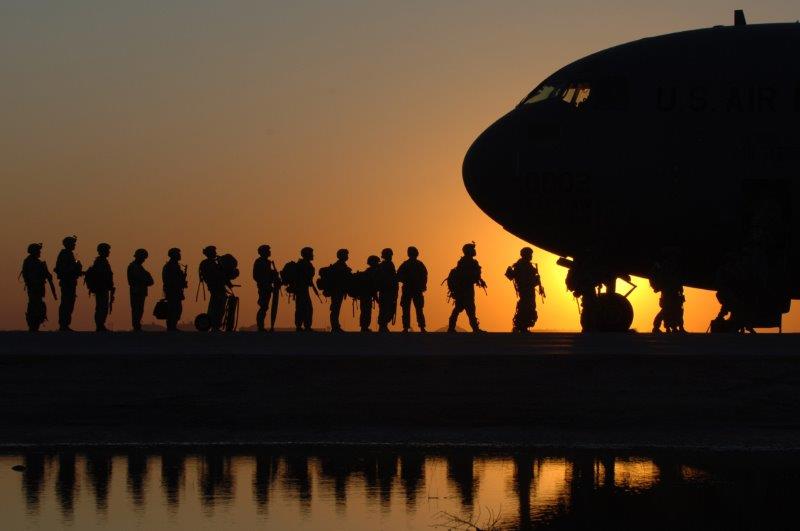During World War II, the military police served a crucial role in maintaining order and discipline in the midst of chaos and uncertainty. These brave men and women were responsible for ensuring the safety and security of soldiers and civilians alike, patrolling military installations, and upholding military law.
The WWII Military Police Corps was established to provide a specialized force to deal with issues related to military law enforcement and security. They played a vital role in ensuring that discipline was maintained among troops during wartime and in safeguarding civilians from harm.
Key Takeaways:
- The WWII Military Police were crucial in maintaining order during wartime.
- Their responsibilities included maintaining law and order, patrolling military installations, and handling criminal investigations.
- The formation and organization of the WWII Military Police Corps was a pivotal moment in military history.
The Formation of Military Police in the Second World War
The establishment of the WWII Military Police Corps was a crucial step in maintaining order and discipline during the chaos of war. In the United States, the Military Police Corps was established on September 26, 1941, just months before the country entered the war.
The Corps was organized into various units, including Military Police Companies, Military Police Battalions, and Military Police Regiments. These units were responsible for maintaining law and order, conducting patrols, and enforcing military regulations. They also handled criminal investigations and provided security for prisoners of war.
One of the primary roles of the Military Police Corps was to uphold military law. Military Police personnel were trained in the Uniform Code of Military Justice and were responsible for ensuring that soldiers in their command were in compliance with military regulations and laws. They also served as a liaison between the military and civilian law enforcement agencies, contributing to the maintenance of discipline and order in military installations and surrounding communities.
Training and Preparation
Recruits to the Military Police Corps were required to undergo rigorous training to acquire the skills and knowledge necessary to carry out their duties effectively. This training included instruction in military law, investigation techniques, and use of force. Military Police personnel were also trained in combat tactics to prepare for the possibility of enemy attacks or combat situations.
The Corps also employed specialized units for certain tasks. For example, the Criminal Investigation Division (CID) was responsible for conducting investigations into serious crimes committed by military personnel, including murder, robbery, and espionage. CID agents received extensive training in criminal investigation techniques and forensic analysis to effectively carry out their duties.

Overseas Operations
As the war progressed, Military Police units were deployed overseas to support the war effort. They played a vital role in maintaining order and discipline among soldiers in combat zones and in occupied territories. Military Police personnel also provided security for military installations, transportation routes, and prisoners of war.
Some Military Police units were also involved in combat operations. For example, the 716th Military Police Battalion was part of the D-Day invasion force and played a crucial role in securing the Normandy beachhead. Other Military Police units were involved in counterintelligence and espionage operations, gathering intelligence and monitoring enemy activities.
The WWII Military Police Corps played a crucial role in maintaining order and discipline during one of the most chaotic and destructive periods in human history. Their contributions to the war effort were significant, and their legacy continues to influence the development and evolution of military police forces around the world.
Responsibilities of WWII Military Police During Wartime
During World War II, the Military Police were responsible for maintaining law and order among military personnel. They were tasked with ensuring compliance with military regulations and laws while also providing security to military installations and units. The role of the Military Police extended beyond the military personnel and into the civilian population, as they also had the responsibility of protecting civilians from criminal activities such as theft and assault.
The Military Police were also responsible for handling criminal investigations and maintaining order in prisoner of war camps. In addition to this, they provided security for military convoys and ensured the safe movement of troops and supplies. They played a crucial role in maintaining discipline and morale among soldiers operating in austere and dangerous environments.
The Military Police were also involved in enforcing the laws of war and identifying and apprehending war criminals. They were trained in military intelligence and conducted counterintelligence activities, gathering information and providing support to military intelligence units. In doing so, they played a critical role in safeguarding the military and the United States as a whole.
The Corps of Military Police was divided into several specialized units, including the Criminal Investigation Division (CID), the Traffic Regulating Detachment (TRD), and the Security and Intelligence Division (SID). Each of these units was tasked with specific duties and responsibilities, and the Military Police worked closely with civilian law enforcement agencies when necessary.

The Military Police underwent specialized training to prepare them for their roles and responsibilities in war zones. They were trained in firearms and combat techniques and were required to have a solid understanding of military law and regulations. Military Police officers were required to have exceptional physical fitness and mental agility to perform their duties efficiently.
The responsibilities of WWII Military Police included:
- Maintaining law and order among military personnel
- Ensuring compliance with military regulations and laws
- Providing security to military installations and units
- Protecting civilians from criminal activities
- Handling criminal investigations
- Maintaining order in prisoner of war camps
- Providing security for military convoys and ensuring the safe movement of troops and supplies
- Enforcing the laws of war and identifying and apprehending war criminals
The responsibilities and duties of the Military Police played a significant role in the success of the United States during World War II. Their ability to maintain order and discipline among military personnel and safeguard civilians from criminal activities ensured the smooth functioning of the military and improved morale among military personnel. Their contributions to the war effort and the development of military police forces worldwide are a testament to their enduring legacy.
Collaboration with Civilian Police Forces
The WWII Military Police worked closely with civilian police forces to maintain law and order both on and off military installations. This partnership was crucial in preventing crime and ensuring the safety and security of soldiers and civilians alike. The exchange of information and resources between military and civilian authorities was essential in the successful management of wartime situations.
The cooperation between the WWII Military Police and civilian police forces was not always seamless, however. Differences in jurisdictional authority and training sometimes led to confusion and miscommunication. Nevertheless, both groups recognized the importance of collaboration in maintaining order and discipline, and continued to work together throughout the war.
Did You Know: The Joint Planning Committee was established in 1940 in order to coordinate activities in London during World War II between military police and metropolitan police. The committee was responsible for planning and executing joint operations, such as the policing of air raid shelters and the control of traffic in the city. It also served as a forum for communication and cooperation between the two forces.
An example of successful collaboration between military and civilian police forces was the creation of the Military Police Reserve Corps in 1941. This group was made up of civilian police officers who were trained to work alongside military personnel in maintaining law and order on military installations. Their specialized skills and experience proved invaluable in ensuring the safety and security of soldiers and civilians during the war.
WWII Military Police and Prisoners of War
As the war progressed, the WWII Military Police found themselves faced with the difficult task of managing a large number of prisoners of war. From custody to transportation, and ultimately security, the Military Police had to ensure not only the safekeeping of prisoners but also prevent escapes and protect them from harm.
One notable challenge was dealing with the sheer number of prisoners, as many POW camps were overcrowded. The Military Police had to maintain order and discipline, even in such cramped conditions. They were also responsible for ensuring prisoners received adequate food, clothing, and medical care.
Despite the challenges, the Military Police remained committed to their duty, and their efforts were crucial in preventing escapes and maintaining order in POW camps. They also played a key role in the repatriation of prisoners of war after the war's end, ensuring that they returned home safely and with dignity.

"Our duty is to treat prisoners of war humanely, and to ensure they are safely returned to their own country."
WWII Military Police and Military Intelligence
The WWII Military Police played a critical role in supporting military intelligence operations during the war. Their involvement in gathering information, surveillance, and counterintelligence activities provided valuable insights that contributed to the Allied victory. The Military Police were responsible for ensuring the security of military installations, as well as tracking enemy movements and identifying potential threats.
The Military Police worked closely with other intelligence agencies, such as the Office of Strategic Services (OSS), to gather and analyze intelligence. They also collaborated with civilian law enforcement agencies to share information and coordinate efforts. The Military Police's ability to gather and analyze intelligence played a key role in many of the Allied forces' successful operations.
One of the most significant intelligence operations undertaken by the Military Police was the interrogation of prisoners of war (POWs). The Military Police used a variety of tactics to extract information from POWs, including psychological methods and physical coercion. They also analyzed documents and other materials seized from enemy forces to gather intelligence on enemy operations and tactics. The information obtained through these methods was crucial to the success of many Allied operations.
Overall, the WWII Military Police's involvement in military intelligence operations was an essential component of the Allied war effort. Their contributions helped to ensure that vital information was gathered and analyzed, and that the Allied forces were able to stay one step ahead of their enemies

Training and Recruitment of WWII Military Police
The formation of the WWII Military Police Corps was a significant move that laid the foundation for maintaining law and order during wartime. To ensure that the soldiers were safe and that the military law was upheld, the corps needed to be competent, skilled, and highly trained.
Did You Know: Recruiting for the corps was a rigorous process. Candidates had to meet specific qualifications, including being physically fit, having a minimum age of 21 years old, and passing a security clearance. Those who were successful then underwent an intense, eight-week training program that included classes on military law, weapons handling, self-defense, and tactics. They also had to pass a final exam before being deployed.
Aside from the basic training, MP officers also received specialized instruction in investigations, criminal law, traffic control, and patrol techniques. This knowledge was critical in enabling them to carry out their duties effectively.
The demands of the war meant that MPs needed to be adaptable and capable of dealing with a range of challenging situations. As a result, they were trained in a variety of areas, including crowd control, close-quarters combat, and riot suppression.
Despite the rigorous training, the rapid expansion of the corps meant that there was a shortage of qualified officers. This forced the military to enlist soldiers who had civilian law enforcement experience to fill the ranks. These soldiers received accelerated training that built on their existing skills, giving them the necessary expertise to become effective Military Police officers.
Specialized Units
In addition to the standard training, certain MP units received specialized instruction to fulfill specific roles. For instance, soldiers in the criminal investigation division were trained in forensic evidence collection and analysis, while those in the traffic division received instruction in traffic laws and accident reconstruction. The dog platoons were also highly trained, with dogs and handlers undergoing a 12-week course in canine handling, first aid, and basic veterinary care.
The specialized training equipped WWII Military Police officers with the expertise required to handle complex tasks effectively. The rigorous training and selection process ensured that only the best soldiers were recruited, making the Military Police Corps one of the most effective military police forces in history.
Notable WWII Military Police Units
Throughout the World War II, a number of specialized units within the WWII Military Police Corps were formed to carry out specific tasks and roles. These units played a crucial role in ensuring the safety and security of both soldiers and civilians, and their contributions were instrumental in the overall war effort.
| Unit Name | Role and Accomplishments |
|---|---|
| 1st Military Police Company | First military police unit to go overseas in the Second World War. Assigned to the Pacific Theater and were responsible for maintaining law and order, as well as handling prisoners of war. |
| 716th Military Police Battalion | Assigned to the European Theater, this unit was responsible for security and traffic control in the Normandy beachhead after the D-Day invasion. They also played a role in the capture of Cherbourg. |
| 45th Military Police Company | Assigned to the European Theater, this unit was responsible for maintaining order and security in Paris after its liberation in 1944. They played a key role in restoring public order and ensuring a smooth transition to civilian control. |
| 92nd Military Police Battalion | Assigned to the Korean Theater, this unit was the first African American military police battalion to be deployed overseas. They played a crucial role in maintaining order and security during the Korean War. |
These units, and many others within the WWII Military Police Corps, demonstrated the critical role that military police forces can play in times of conflict. Their bravery, dedication, and commitment to upholding law and order helped ensure a successful outcome to the war, and their legacy continues to have an impact on military police forces around the world today.
Challenges Faced by WWII Military Police

The role of the WWII Military Police was not without its challenges and obstacles. As with any organization tasked with maintaining order and discipline during wartime, the men and women of the Military Police Corps faced many unique difficulties in carrying out their duties.
One of the main challenges they faced was the unpredictable and chaotic nature of war. The constantly changing battlefield conditions meant that the Military Police had to be adaptable and flexible in their approach to maintaining law and order. They had to be able to respond quickly to changing situations and make split-second decisions to ensure the safety of soldiers and civilians alike.
The Military Police were faced with challenges in dealing with prisoners of war. With the large number of captured soldiers, the Military Police had to ensure the safe custody, transportation, and security of these prisoners. This often meant dealing with language barriers, cultural differences, and varying levels of cooperation from the prisoners themselves.
Another major challenge for the Military Police was collaborating with civilian police forces. While cooperation was essential in maintaining order and the exchange of information and resources, there were often tensions between the military and civilian law enforcement agencies. This was particularly true in areas where there was a significant military presence, and the local civilian police felt that their authority was being undermined.
The Military Police also faced challenges in training and recruitment. As a specialized branch of the military, they required specific skills and knowledge to carry out their duties effectively. However, finding and training personnel who possessed these skills was not always easy, particularly in the heat of wartime when resources were stretched thin.
Despite these challenges, the WWII Military Police remained a crucial force for maintaining order and security during the Second World War. Their dedication and bravery in the face of adversity ensured that soldiers and civilians alike were able to live as safely and securely as possible in an otherwise chaotic and uncertain time.
Legacy and Influence of WWII Military Police
The WWII Military Police Corps played a crucial role in maintaining order and security during the Second World War. Their contributions to the war effort and tactical success were vital, and their legacy has had a lasting impact on the development and evolution of military police forces around the world.
The establishment and organization of the WWII Military Police Corps set a precedent for future military police units. Their responsibilities in maintaining discipline, upholding military law, and collaborating with civilian police forces became standard operating procedures for most military police units.
The training process and requirements for joining the WWII Military Police also set a standard for future military police training programs. The specialized skills and knowledge they acquired, including law enforcement, criminal investigation, and military tactics, became essential for all military police officers.
Notable WWII Military Police units, such as the 793rd Military Police Battalion and the 716th Military Police Battalion, demonstrated the importance of military police in supporting combat operations. These units were responsible for maintaining law and order, guarding prisoners of war, and providing security for military installations.
However, the challenges faced by WWII Military Police were significant. The chaotic and unpredictable nature of war made it difficult to maintain order and discipline. The large number of prisoners of war had to be managed, transportation logistics had to be coordinated, and security had to be ensured.

The legacy and influence of WWII Military Police can be seen in the military police units of many countries today. Their contributions during the Second World War paved the way for modern military police forces, and their dedication and sacrifice will not be forgotten.
Conclusion
The WWII Military Police were a crucial force for order in the chaos of war. They played a vital role in maintaining discipline, upholding military law, and safeguarding soldiers and civilians alike.
As discussed in this article, the formation of the WWII Military Police Corps was a significant event that laid the foundation for their important role. Their responsibilities included maintaining law and order, patrolling military installations, handling criminal investigations, and collaborating with civilian police forces.
The WWII Military Police faced significant challenges in managing prisoners of war and supporting military intelligence operations. However, with specialized training and recruitment, they were able to overcome these obstacles and make significant contributions to the overall war effort.
The legacy and influence of WWII Military Police can still be felt today in the development and evolution of military police forces around the world. Their contributions to maintaining order and security during the Second World War will always be remembered.
FAQ
Q: What is the role of WWII Military Police?
A: WWII Military Police were responsible for maintaining order and enforcing military law during the chaos of war. They safeguarded soldiers and civilians alike.
Q: What were the responsibilities of WWII Military Police?
A: WWII Military Police had various duties, including maintaining law and order, patrolling military installations, ensuring compliance with regulations, and handling criminal investigations.
Q: Did WWII Military Police collaborate with civilian police forces?
A: Yes, WWII Military Police and civilian police forces worked together to maintain order and exchange information and resources.
Q: How did WWII Military Police deal with prisoners of war?
A: WWII Military Police were responsible for the custody, transportation, and security of prisoners of war, facing challenges in managing a large number of captured soldiers.
Q: What was the role of WWII Military Police in military intelligence operations?
A: WWII Military Police supported military intelligence by gathering information, conducting surveillance, and participating in counterintelligence activities.
Q: What training and recruitment process did WWII Military Police go through?
A: Joining the WWII Military Police required specialized training and fulfilling specific requirements to acquire the necessary skills and knowledge for their duties.
Q: Can you mention notable WWII Military Police units?
A: There were several notable WWII Military Police units that made significant contributions to the war effort and achieved tactical successes including the 793rd and the 716th Military Police Battalions.
Q: What challenges did WWII Military Police face?
A: WWII Military Police encountered challenges in maintaining order and discipline due to the unpredictable and chaotic nature of war.
Q: What is the legacy and influence of WWII Military Police?
A: The legacy of WWII Military Police extends to the development and evolution of military police forces worldwide.











